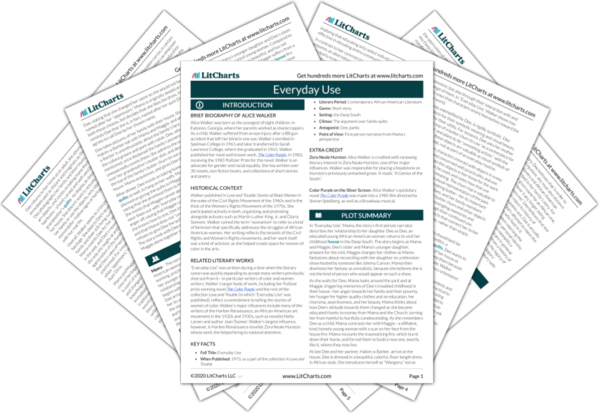Heritage, and its relationship to daily life, is the central question that Walker explores in “Everyday Use.” Through the eyes of Mama, and through the contrasting characters of Dee and Maggie, Walker offers two varying views of what family history, the past, and “heritage” really mean.
In Dee’s view, heritage is a kind of dead past, distanced from the present through nostalgia and aestheticization (which means reducing something to a symbol or piece of art, and so removing other meanings and uses from it). Dee rejects the parts of her heritage that belong to the immediate past or, even, are still present in the family’s everyday life. Because of this, she disdains her sister and mother’s life on the farm, their continued use of family heirlooms, and their ancestral house. Dee shows her anger towards this immediate past in her happiness when their house burned, her readiness to leave her home behind when she went to college, and her lack of interest in learning family skills like sewing. Instead of this immediate heritage, Dee idealizes an African culture that she only shallowly understands, one that predates her family’s history in the United States and the history of slavery. She chooses that culture as the basis for her “heritage,” calling herself by the African name “Wangero” and altering her style of dress. When Dee returns to her home as an adult, she attempts to make her immediate past as distant and imaginary as this African one. Dee photographs her family and their house, turning them into art-objects, and insists on taking home the family’s heirlooms—a hand-carved and well used butter churn, her grandmother’s quilts—to display as decorations and artifacts in her house. She doesn’t want to actually live in the house with her family or use the objects, only idealize them as memorabilia—hollow signs of heritage that have no connection with her real life.
Overall, Walker seems to criticize this imagined, distant view of heritage. She depicts Dee’s quaint, aestheticized vision of her family and their still-living customs as cold, elitist, and hurtful. Mama resents Dee for her attempts to put their lifestyle firmly in the past, and Dee’s meanness in this respect can be seen in the way she laughs at and looks down on Maggie for her appreciation of the family history. Moreover, Walker suggests that Dee’s view of heritage is utterly misguided and uninformed. For instance, Dee believes that she is named after white “oppressors,” when in fact she is named after her beloved Aunt Dicie.
Mama and Maggie, on the other hand, exemplify the alternative view of heritage that Walker proposes— one in which heritage is a part of everyday life, fluid and constantly being added to and changed. Mama and Maggie have no higher education or knowledge of Africa, but they do appreciate their more immediate roots: their house, their family heirlooms, their traditions. The quilts, which Dee wants to display as art, Maggie would put to “everyday use,” using them as blankets, putting them on beds—the way they were intended to be used. Maggie, unlike Dee, also learned to sew from her grandmother, and so can add to the family collection, pass on her skills, and keep the tradition alive.
In refusing to give the quilts to Dee and instead giving them to Maggie, Mama rejects Dee’s idealized view of heritage and instead embraces a relationship to heritage that is dynamic and continually developing. Though perhaps Mama and Maggie’s view of heritage could also be enriched by education and knowledge of their African roots, the fact that they don’t distance themselves from their family history makes their understanding of heritage more real and significant than Dee’s. As a result, Dee’s accusation that Mama does not “understand” their heritage rings as bitterly ironic, since Walker has made it clear that Dee is the one out of touch with her family’s way of life.
Heritage and the Everyday ThemeTracker

Heritage and the Everyday Quotes in Everyday Use
How long ago was it the house burned? Ten, twelve years? Sometimes I can still hear the flames and feel Maggie’s arms sticking to me, her hair smoking and her dress falling off her in little black papery flakes. Her eyes seemed stretched open, blazed open by the flames reflected in them. And Dee…Why don’t you dance around the ashes? I’d wanted to ask her. She had hated that house so much.
‘What happened to Dee?’ I wanted to know.
‘She’s dead,’ Wangero said. ‘I couldn’t bear it any longer, being named after the people who oppress me.’
You didn’t even have to look close to see where hands pushing the dasher up and down to make butter had left a kind of sink in the wood. In fact, there were a lot of small sinks; you could see where thumbs and fingers had sunk into the wood. It was a beautiful light yellow wood, from a tree that grew in the yard where Big Dee and Stash lived.
Maggie can’t appreciate those quilts! ...She’s probably backward enough to put them into everyday use.
‘You just don’t understand,’ she said, as Maggie and I came out to the car.
‘What don’t I understand?’ I wanted to know.
‘Your heritage,’ she said.
















